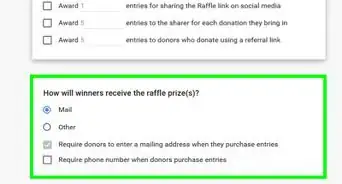X
wikiHow is a “wiki,” similar to Wikipedia, which means that many of our articles are co-written by multiple authors. To create this article, volunteer authors worked to edit and improve it over time.
Learn more...
Charity Entrepreneurship estimates that starting a high-impact charity has the same impact as donating $200,000 to the most effective NGOs every year. Some charities are thousands of times more effective than others per dollar, so don’t settle for the first charity idea that pops into your mind. Make sure you tackle a pressing problem—the more significant and neglected the problem, the higher your impact.
Steps
Part 1
Part 1 of 3:
Deciding If You're The Right Fit
-
1Consider your personality. With no boss and few deadlines, you will need the motivation to stick for the 5–10 years required to kick off your charity.
- While not all these traits are necessary, a great entrepreneur is self-motivated, organised, irrepressible, open-minded, and creative.
- Founders tend to handle many things ‘just well enough’ (usually with little training or guidance) and focus on the few things that are worth doing well.
-
2Take an online personality test. Do you have what it takes to become a charity entrepreneur? Take a 5-minute, free personality quiz by Charity Entrepreneurship.Advertisement
-
3Consider your motivation. Are you starting a charity to impress others, have an adventure, or feel good about yourself? If so, these motivations will interfere with the ultimate goal of having a large impact.
- 80,000 Hours' career review on Founders of new projects tackling top problems is a great resource to get an overview of what it takes to succeed and how to plan your next steps.
Advertisement
Part 2
Part 2 of 3:
Finding an Effective Intervention
-
1Define a “pressing problem”. The scale of the problem you work on might determine the majority of your impact. The most pressing problems are:
- Big: What’s the size in orders of magnitude? How much effect will solving the problem have in the long run?
- Neglected: How many people and resources are tackling this problem? How well allocated are these resources?
- Solvable: How easy would it be to make progress on this problem? Do interventions already exist to solve this problem effectively, and how strong is their evidence?
-
2Choose a pressing problem to solve. Identify an issue that seems big, neglected and solvable, although no problem is a perfect combination of all three. You don’t need to research all by yourself—some of the most pressing problems include:
- Global health and development. Eight hundred million people live in absolute poverty—with less than $2 per day. Five million children die every year, mainly from preventable diseases like tuberculosis, malaria and diarrhea.
- Factory farms, where animals are caged, crammed, mutilated and indoors for all their life. Humans slaughter seventy billion land animals every year—2,000 per second.
- Existential risks threaten the destruction of humanity’s long-term potential. These arise from artificial intelligence, biological hazards, great power conflict, nuclear security and extreme climate change.
-
3Brainstorm a long list of interventions to tackle the problem. Your decision is only as good as the best intervention on your list. You don't need an original idea to have a large impact. See if any of these catch your motivation:
- Project ideas on reducing existential risk from FTX Future Fund
- Top charity ideas by Charity Entrepreneurship
- Alternative protein ideas by the Good Food Institute
- Ideas for megaprojects on the Effective Altruism Forum
-
4Seek advice from many experts. Don't be shy to reach out—experts in nonprofits are often happy to help. Factor experts' advice in your decision, but don't blindly follow recommendations. See this guide on how to factor in experts’ views.
-
5Rank the interventions by effectiveness. Some interventions are thousands of times more effective than others. For example, training a guide dog in the US costs ∼$40,000, while effective international charities can cure trachoma (a disease that leads to blindness) for $25-50 per person.
- Use a spreadsheet to rank options using a weighted-factor model and a cost-effectiveness analysis. Then narrow the list down with rounds of iterative research. Start with shallow research into all ideas, then deeply research the few best ideas.
- The first intervention that popped into your mind might not be the best. So take your time to rank the most effective interventions, even a couple of months—it might be one of your most impactful decisions.
-
6Run cheap tests. Investigate your key uncertainties like a scientist. Start with the least costly ways to learn more (e.g., read online and speak to people) before more expensive steps (e.g., do a trial project). The Lean Startup by Eric Ries provides a framework for entrepreneurs to validate their business ideas and bring them to market quickly and efficiently.
- You don't need to fire yourself from your current job to explore your new nonprofit idea. Instead, try to pursue your project on the side until you are confident and ready to commit full-time.
- Pick one very small and simple version of your idea as a test. You don't need a "perfect launch"—it doesn't exist. Then iterate and improve the product or service.
-
7Consider applying to a charity incubator. An incubation program is a great way to test your personality fit, find a co-founder, and get funding and expert support.
- Charity Entrepreneurship offers a free, two-month online program for effective charities within global health, animal welfare, and ‘meta charities’. They research the most effective interventions, so you don't need an idea. Apply here.
- Fast Forward accelerates tech nonprofits that aim to scale impact.
- Y Combinator—the World's leading startup accelerator—includes a few nonprofits in every startup batch.
-
8Find the right co-founder. Entrepreneurship is an emotional roller coaster and a co-founder can help you stick through the hard times. You both need to enjoy spending time and working with each other and complement each other's skills.
- If you have never worked before with your potential co-founder, start with some trial tasks to test how well you work together. Also explore your compatibility with this questionnaire.
- Read How to Find the Right Co-Founder by YCombinator and check out YC Co-Founder Matching, their free online platform for finding a co-founder.
-
9Decide which country to start operating in. The operating country is different from the country of incorporation, which is where you will get funding. The wrong operating country can reduce your cost-effectiveness and make your charity fail. Identify the most important location factors:
- Is the problem you want to solve highly present in that country? Is it easy to scale your intervention in that country? Do you have a relationship network in that country?
Advertisement
Part 3
Part 3 of 3:
Gathering Support
-
1Build a website. You don't need to pay an agency: build a quick and beautiful website using Wix or WordPress. Design your free logo on Canva. Pick a font in this guide and stick with it in most of your online presence.
-
2Build a strong team. Avoid hiring people at the beginning, or you will need to raise more money—a scarce resource at the start. The co-founders should be able to do the work. Get interns and volunteers for an extra hand.
- Give your colleagues constructive feedback—it will motivate them to build on their strengths. See this guide on how to give and receive feedback.
- If you feel heated and need to talk about something important, try to sleep on it. Avoid making the listener feel defensive by using the Nonviolent Communication Framework.
-
3Get help and advice. It can be surprisingly easy to find help on legal issues. Most big law firms have pro bono programs that you can access. Here’s a list of organisations that can help:
- The National Council of Nonprofits (US) and the Small Charities Coalition (UK) have many free resources on their websites. Professional organisations like TrustLaw and Charity Finance Group connect nonprofits with professionals and resources.
- If your project is within one of 80,000 Hours priority problem areas (Artificial Intelligence alignment, biosecurity, global priorities research, building effective altruism) or problem areas that seem promising, then get a free 1:1 advising session with 80,000 Hours to help you choose your focus and make connections.
- Within animal welfare, Animal Advocacy Careers offers a free online course, job board, and a list of useful resources.
- The Effective Altruism community has a vibrant forum of professionals happy to exchange information, answer questions, and share resources.
-
4Get sufficient funding. You should aim for an amount of funding that will allow you to reach specific goals or some evidence for promise in your approach before you need to start focusing on fundraising again.
- Spend every dollar intelligently. This way, fundraising will always be easier. However, if you spend too much, you will have to raise more money, and you will run out of money sooner.
- Here's a list of funding sources: the Effective Altruism Funds focus on global health and development, animal welfare, longtermism and building effective altruism; FTX Future Fund for improving humanity’s long-term future; Charity Entrepreneurship for global health and development, animal welfare, and building effective altruism; GiveWell Grant for global health and development.
-
5Join an impact-oriented community. Discussing with others is often the best way to make progress on your questions. Effective altruism is a global community with thousands of members. Here are some ways to get connected.
- Join a virtual program to discuss these ideas in a series of online meetups hosted by experienced facilitators.
- Join an effective altruism conference, event or local group to get to know more people within the community.
Advertisement
References
- https://80000hours.org/career-reviews/founder-impactful-organisations/
- Savoie, Joey; Stadler, Patrick. How to Launch a High-Impact Nonprofit. Charity Entrepreneurship. Kindle Edition.
- https://www.probablygood.org/profile-nonprofit-entrepreneurship
About This Article
Advertisement










































































